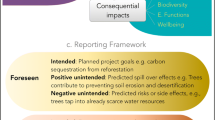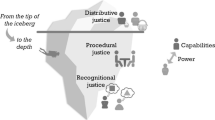Abstract
Scientists working on ecosystem service (ES) science are engaged in a mission-driven discipline. They can contribute to science-policy interfaces where knowledge is co-produced and used. How scientists engage with the governance arena to mobilise their knowledge remains a matter of personal choice, influenced by individual values. ES science cannot be considered neutral and a discussion of the values that shape it forms an important part of the sustainability dialogue. We propose a simple decision tree to help ES scientists identify their role and the purpose of the knowledge they produce. We characterise six idealised scientific postures spanning possible roles at the science-policy interface (pure scientist, science arbiter—guarantor, issue advocate—guardian, officer, honest broker and stealth issue advocate) and illustrate them with feedbacks from interviews. We encourage ES scientists to conduct a reflexive exploration of their attitudes regarding knowledge production and use, with the intention of progressing toward a higher recognition of the political and ethical importance of ES assessments.

Similar content being viewed by others
References
Barnaud, C., and M. Antona. 2014. Deconstructing ecosystem services: Uncertainties and controversies around a socially constructed concept. Geoforum 56: 113–123.
Boerema, A., A.J. Rebelo, M.B. Bodi, K.J. Esler, and P. Meire. 2017. Are ecosystem services adequately quantified? Journal of Applied Ecology 54: 358–370.
Brooks, T.M., J.F. Lamoreux, and J. Soberón. 2014. IPBES ≠ IPCC. Trends in Ecology & Evolution 29: 543–545.
Chan, K.M.A., A.D. Guerry, P. Balvanera, S. Klain, T. Satterfield, X. Basurto, A. Bostrom, R. Chuenpagdee, et al. 2012. Where are cultural and social in ecosystem services? A framework for constructive engagement. BioScience 62: 744–756.
Coreau, A., C. Nowak, and L. Mermet. 2013. L’expertise pour les politiques nationales de biodiversité en France: quelles stratégies face aux mutations en cours? VertigO 13: 2.
Courchamp, F., J.A. Dunne, Y. Le Maho, R.M. May, C. Thébaud, and M.E. Hochberg. 2015. Fundamental ecology is fundamental. Trends in Ecology & Evolution 30: 9–16.
Crouzat, E., B. Martín-López, F. Turkelboom, and S. Lavorel. 2016. Disentangling trade-offs and synergies around ecosystem services with the Influence Network Framework: Illustration from a consultative process over the French Alps. Ecology & Society 21: 32.
Davies, K.K., K.T. Fisher, M.E. Dickson, S.F. Thrush, and R.Le. Heron. 2015. Improving ecosystem service frameworks to address wicked problems. Ecology and Society 20: 37.
Díaz, S., S. Demissew, J. Carabias, C. Joly, M. Lonsdale, N. Ash, A. Larigauderie, J.R. Adhikari, et al. 2015. The IPBES Conceptual Framework—connecting nature and people. Current Opinion in Environmental Sustainability 14: 1–16.
Donner, S.D. 2014. Finding your place on the science–advocacy continuum: An editorial essay. Climatic Change 124: 1–8.
Elias, N. 1956. Problems of involvement and detachment. The British Journal of Sociology 7: 226–252.
Fernández, R.J. 2016. How to be a more effective environmental scientist in management and policy contexts. Environmental Science & Policy 64: 171–176.
Fisher, J.A., and K. Brown. 2014. Ecosystem services concepts and approaches in conservation: Just a rhetorical tool? Ecological Economics 108: 257–265.
Garrard, G.E., F. Fidler, B.C. Wintle, Y.E. Chee, and S.A. Bekessy. 2015. Beyond advocacy: Making space for conservation scientists in public debate. Conservation Letters 9: 208–212.
Gieryn, T.F. 1983. Boundary-work and the demarcation of science from non-science: Strains and interests in professional ideologies of scientists. American Sociological Review 48: 781–795.
Gómez-Baggethun, E., and M. Ruiz-Pérez. 2011. Economic valuation and the commodification of ecosystem services. Progress in Physical Geography 35: 613–628.
Gorddard, R., M.J. Colloff, R.M. Wise, D. Ware, and M. Dunlop. 2016. Values, rules and knowledge: Adaptation as change in the decision context. Environmental Science & Policy 57: 60–69.
Guerry, A.D., S. Polasky, J. Lubchenco, R. Chaplin-Kramer, G.C. Daily, R. Griffin, M. Ruckelshaus, I.J. Bateman, et al. 2015. Natural capital and ecosystem services informing decisions: From promise to practice. Proceedings of the National Academy of Sciences of the USA 112: 7348–7355.
Gupta, A. 2008. Transparency under scrutiny: Information disclosure in global environmental governance. Global Environmental Politics 8: 1–7.
Gupta, A. 2010. Transparency in global environmental governance: A coming of age? Global Environmental Politics 10: 1–9.
Haines-Young, R., and M. Potschin. 2010. The links between biodiversity, ecosystem services and human well-being. In Ecosystem ecology: A new synthesis, ed. D. Raffaelli, and C. Frid, 110–139. Cambridge: Cambridge University Press.
Hulme, P.E. 2014. Bridging the knowing-doing gap: Know-who, know-what, know-why, know-how and know-when. Journal of Applied Ecology 51: 1131–1136.
Jasanoff, S. 1990. The fifth branch: Scientific advisors as policymakers. Cambridge, MA: Harvard University Press.
Jax, K., D.N. Barton, K.M.A. Chan, R. de Groot, U. Doyle, U. Eser, C. Görg, E. Gómez-Baggethun, et al. 2013. Ecosystem services and ethics. Ecological Economics 93: 260–268.
Kull, C.A., X. Arnauld de Sartre, and M. Castro-Larrañaga. 2015. The political ecology of ecosystem services. Geoforum 61: 122–134.
Latour, B., and S. Woolgar. 1979. Laboratory life: The construction of scientific facts. Princeton, NJ: Princeton University Press.
Lavorel, S., K. Grigulis, P. Lamarque, M.-P. Colace, D. Garden, J. Girel, G. Pellet, and R. Douzet. 2011. Using plant functional traits to understand the landscape distribution of multiple ecosystem services. Journal of Ecology 99: 135–147.
Luck, G.W., K.M.A. Chan, U. Eser, E. Gómez-Baggethun, B. Matzdorf, B. Norton, and M.B. Potschin. 2012. Ethical considerations in on-ground applications of the ecosystem services concept. BioScience 62: 1020–1029.
Mace, G.M. 2014. Whose conservation? Science 345: 1558–1560.
Martín-López, B., E. Gómez-Baggethun, M. García-Llorente, and C. Montes. 2014. Trade-offs across value-domains in ecosystem services assessment. Ecological Indicators 37: 220–228.
McKenzie, E., S. Posner, P. Tillmann, J.R. Bernhardt, K. Howard, and A. Rosenthal. 2014. Understanding the use of ecosystem service knowledge in decision making: lessons from international experiences of spatial planning. Environment and Planning C: Government and Policy 32: 320–340.
Pade-Khene, C., R. Luton, T. Jordaan, S. Hildbrand, C.G. Proches, and A. Sitshaluza. 2013. Complexity of stakeholder interaction in applied research. Ecology and Society 18: 13.
Pielke, R.A. 2007. The honest broker: Making sense of science in policy and politics. Cambridge: Cambridge University Press.
Primmer, E., and E. Furman. 2012. Operationalising ecosystem service approaches for governance: Do measuring, mapping and valuing integrate sector-specific knowledge systems? Ecosystem Services 1: 85–92.
Raymond, C.M., G. Singh, K. Benessaiah, J.R. Bernhardt, J. Levine, H. Nelson, N.J. Turner, B. Norton, et al. 2013. Ecosystem services and beyond: Using multiple metaphors to understand human–environment relationships. BioScience 63: 536–546.
Sandbrook, C., I.R. Scales, B. Vira, and W.M. Adams. 2011. Value plurality among conservation professionals. Conservation Biology 25: 285–294.
Schulp, C.J., B. Burkhard, J. Maes, J. Van Vliet, and P.H. Verburg. 2014. Uncertainties in ecosystem service maps: A comparison on the European scale. PLoS ONE 9: e109643.
Stirling, A. 2010. Keep it complex. Nature 468: 1029–1031.
Sukhdev, P. 2009. Costing the earth. Nature 462: 277.
Tsoukas, H. 1997. The tyranny of light: The temptations and the paradoxes of the information society. Futures 29: 827–843.
Turnhout, E., S. Van Bommel, and M.N.C. Aarts. 2010. How participation creates citizens: Participatory governance as performative practice. Ecology and Society 15: 26–41.
Turnhout, E., M. Hisschemöller, and H. Eijsackers. 2007. Ecological indicators: Between the two fires of science and policy. Ecological Indicators 7: 215–228.
Turnhout, E., M. Stuiver, J. Klostermann, B. Harms, and C. Leeuwis. 2013. New roles of science in society: Different repertoires of knowledge brokering. Science & Public Policy (SPP) 40: 281–292.
van den Hove, S. 2007. A rationale for science-policy interfaces. Futures 39: 807–826.
van der Hel, S. 2016. New science for global sustainability? The institutionalisation of knowledge co-production in Future Earth. Environmental Science & Policy 61: 165–175.
Wilhere, G.F. 2012. Inadvertent advocacy. Conservation Biology 26: 39–46.
Young, J.C., K.A. Waylen, S. Sarkki, S. Albon, I. Bainbridge, E. Balian, J. Davidson, D. Edwards, et al. 2014. Improving the science-policy dialogue to meet the challenges of biodiversity conservation: Having conversations rather than talking at one-another. Biodiversity and Conservation 23: 387–404.
Acknowledgements
This work was funded by ERAnet BiodivERsA project CONNECT, with support from the French Agence Nationale pour la Recherche, and by the project OPERAs FP7-ENV-2012-two-stage-308393.
Author information
Authors and Affiliations
Corresponding author
Electronic supplementary material
Below is the link to the electronic supplementary material.
Rights and permissions
About this article
Cite this article
Crouzat, E., Arpin, I., Brunet, L. et al. Researchers must be aware of their roles at the interface of ecosystem services science and policy. Ambio 47, 97–105 (2018). https://doi.org/10.1007/s13280-017-0939-1
Received:
Revised:
Accepted:
Published:
Issue Date:
DOI: https://doi.org/10.1007/s13280-017-0939-1




